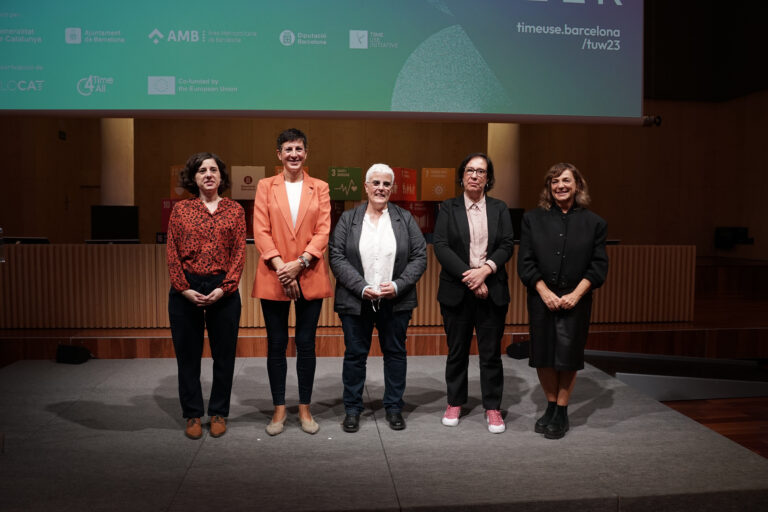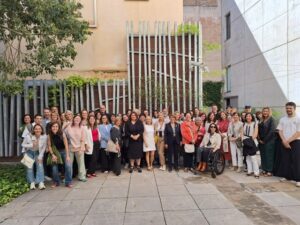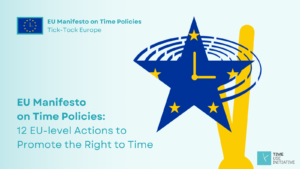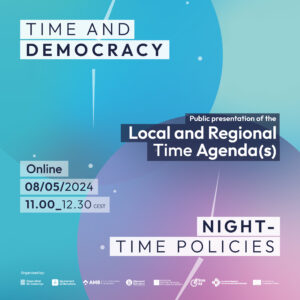Time Use Week 2023 discusses tools for building a framework that ensures a new time balance between work, leisure, rest, and care.
The week, which celebrates its international events in October 17th and October 18th, invites municipalities, institutions, and experts from around the world to participate.
The Government of Catalonia, the Barcelona City Council, the Barcelona Provincial Council, and the Metropolitan Area of Barcelona inaugurated the tenth edition of Time Use Week 2023 this morning, under the theme “For a New Time Balance”. This year’s edition aims to seek the legislative, political, and social framework necessary to define a new organization of daily life that includes work time, leisure time, relaxation time, and caregiving time.
The International Time Week will delve into the debate on public policies to implement a new citizen’s right on October 17th; the right to time, which aims to ensure that all individuals have time for themselves, reducing time poverty and improving their well-being. This discussion will take place within the framework of the general meeting of the Network of Local and Regional Governments for Time Policies. Some examples of these policies include the creation of proximity urban models to reduce commuting time, the development of infrastructure and support services for caregiving, or the promotion of new models of work time organization, among others. The future of work time will be the other central topic of discussion on October 18th, addressing how public and private entities are addressing it. There will be debates and presentations of a conceptual proposal on work time in sessions aimed at including the most relevant social and productive agents.
Time Use Week started today, October 16th, with the General Meeting of the Catalan Network for the Right to Time and the official inauguration, and will conclude on October 20th, positioning Catalonia as a meeting point for time policies, a new type of welfare policies in line with the Agenda 2030 and the new urban agenda. Furthermore, following the pattern of previous editions, Time Use Week 2023 will also decentralize across Catalonia on October 19th and 20th so that all territories can contribute ideas and practices to the right to time, adapting the concept to local realities.
During the opening event of Time Use Week, various institutional representatives highlighted:
Montserrat Pineda, secretary of Feminisms of the Government of Catalonia, has stated that “time is not harmless, it is not equal, 24h are not equal for everyone. Time has a strong gender impact. Unfortunately, women still devote almost twice as many hours a day to homework and unpaid care as men.” She stressed that “we in the Government of Catalonia promote policies that improve the reconciliation of living times and promote co-responsibility to the care of everyone to guarantee the right to time of all people, especially those who suffer most time poverty, such as the Time for Care programme.”
Raquel Gil Eiroá, councillor of Economic Promotion, Labour, Feminisms and Democratic Memory and councillor of the District of Sants-Montjuïc of the Barcelona City Council, recalled: “20 years ago, the Barcelona City Council created the Councillor for Time Use, a pioneer institution in Spain and the first in Europe. Since then, the time dimension has been central to the municipal agenda, as demonstrated by the more than 70 actions we are currently carrying out. We see the right to time as a right of citizenship, and in that way we look to the future.”
Filo Cañete Carrillo, deputy delegate of Care and Life Cicles of Barcelona Provincial Council, stressed that “to talk about the uses of times is to recognise the social inequalities that are associated with them, especially if we look at the social organisation of care. These inequalities bear the face of a woman, but also of class and origin”. She added that “talking about time policies equals to talking about social rights for citizen, justice and equal opportunities. We need a gender and social, cross-cutting and intersecting look at co-responsibility and work from social innovation and local government proximity so that municipalities can be places of time and opportunity.”
Ester Pujol, Director of the Area of Social and Economic Development of the Metropolitan Area of Barcelona, has highlighted the Metropolitan Agreement for the Right to Time, approved last March, as a “frame to promote the policies of time in the metropolis of Barcelona, which are key to moving towards a healthier, more egalitarian, with a higher quality of life, cohesive and sustainable society”. Pujol recalled that “if we want a more competitive metropolis, we must improve time management”.
Ariadna Güell Sans, co-coordinator of the Time Use Initiative, has stated that “this week will help many people and organisations to visualize the need to find a new balance in the social organisation of time, finding tools to make it a reality in each of their territories. A new balance that includes the right to time of all people as a fundamental right to move towards healthier, more egalitarian, more efficient and more sustainable societies, ultimately towards happier societies”.
Time Use Week 2023 is co-organized by the Government of Catalonia, the Barcelona City Council, the Barcelona Provincial Council, the Metropolitan Area of Barcelona, and the Time Use Initiative. It counts with the collaboration of DIPLOCAT and Time4All (a project co-funded by the European Union).








